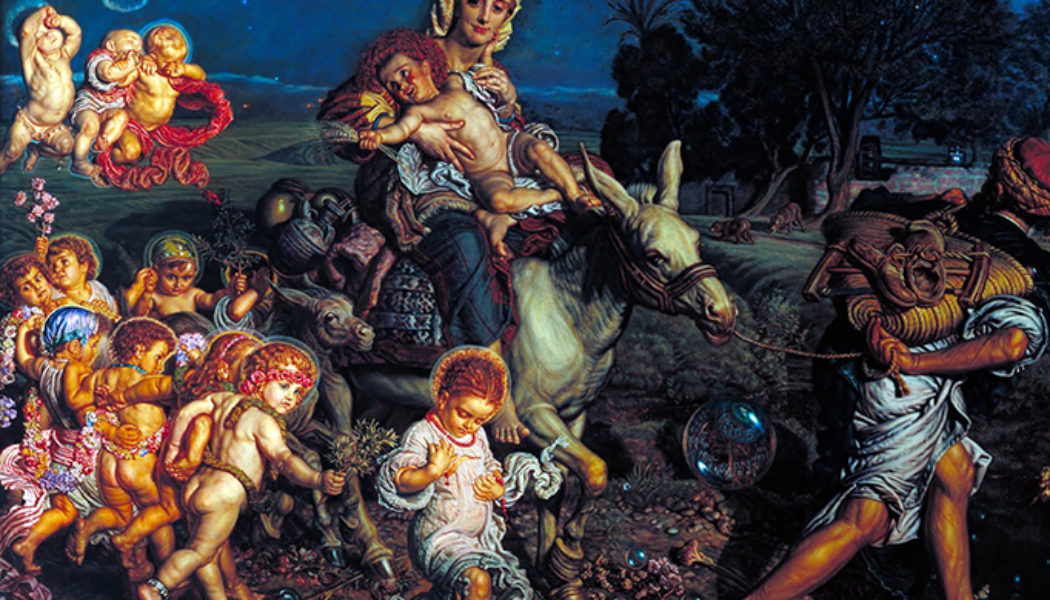
To discount what Matthew says just because we don’t have an independent record would be to ignore credible historical evidence.
On Dec. 28, the Church commemorates the slaughter of the holy innocents.
These are the baby boys in Bethlehem that Herod the Great had slaughtered in an attempt to kill the Baby Jesus.
But many people today challenge the idea that this ever took place.
“We have no record of it!” they say.
Actually, we do …
Who Was Herod the Great?
Herod the Great was the king of Judea at the time Jesus was born.
He had the title “king,” but he was not an independent ruler. Instead, he was a client king of the Roman empire who had been named “King of the Jews” by the Roman Senate.
This meant that he was a local ruler who ultimately answered to Rome and who owed his throne to the Roman Senate.
Religiously, Herod was a Jew, but ethnically, he was descended from a neighboring people, the Idumeans. They had been forcibly converted to Judaism in the time of the Maccabees (Josephus, Antiquities of the Jews 13:9:1).
As a ruler, he built a lot of things–fortresses, aqueducts, theaters, etc. Undertaking major public works projects was one of the ways that rulers in the ancient world built a legacy for themselves.
His most famous building projects was the Temple in Jerusalem, which he began dramatically expanding.
He also had another side …
Paranoid and Bloodthirsty
Particularly toward the end of his reign, Herod was increasingly paranoid, perceiving plots against his throne right and left.
Some of these plots he thought were being hatched by members of his own family.
But that didn’t stop him from dealing with them ruthlessly.
When faced with a perceived threat to his power he was willing to kill his own family members.
He killed one of his wives, Mariamne, and three of his sons: Alexander, Aristobulus, and Antipater.
Think of the body count just within his own family: Four people. A wife and three sons!
What kind of monster does that to his own family members?
It is no surprise that Caesar Augustus reportedly quipped, “It is better to be Herod’s pig than son” (Macrobius, Saturnalia 2:4:2).
The joke was that since Herod was a Jew and would not eat pork, his pig would be safe. But his sons were not safe.
Total. Moral. Monster.
His cruelty lasted right up until the end, when he ordered that one person in every family should be slain so that the whole kingdom would be forced to mourn at the occasion of his death.
The Jewish historian Josephus records:
He commanded that all the principal men of the entire Jewish nation wheresoever they lived, should be called to him.
Accordingly, there were a great number that came, because the whole nation was called, and all men heard of this call, and death was the penalty of such as should despise the letters that were sent to call them.
And now the king was in a wild rage against them all, the innocent as well as those that had afforded him ground for accusations.
And when they were come, he ordered them all to be shut up in the hippodrome, and sent for his sister Salome, and her husband Alexas, and spoke thus to them:— “I shall die in a little time … but what principally troubles me is this, that I shall die without being lamented, and without such mourning as men usually expect at a king’s death.”
For that he was not unacquainted with the temper of the Jews, that his death would be a thing very desirable, and exceedingly acceptable to them; because during his lifetime they were ready to revolt from him. …
[Herod therefore ordered] those that are in custody shot with their darts. …
[H]e took care, when he was departing out of this life, that the whole nation should be put into mourning, and indeed made desolate of their dearest kindred, when he gave order that one out of every family should be slain, although they had done nothing that was unjust, or against him, nor were they accused of any other crimes [Josephus, Antiquities of the Jews 17:6:5-6].
Got that?
Herod rounded up the leading men of Israel and ordered them to be killed upon his death, just so every family would be forced to mourn at his passing.
Total. Moral. Monster.
The Slaughter of the Innocents
So when, in his late, paranoid phase, the magi show up and ask, “Where is he that is born king of the Jews?” what is Herod going to do?
He’s going to freak out.
It’s no surprise that Matthew writes [1:3]:
When Herod the king heard this, he was troubled, and all Jerusalem with him.
You bet all Jerusalem was troubled!
They knew the lengths Herod would go to in his efforts to protect his throne from rival claimants.
So if he couldn’t find the infant he was looking for, Herod wiping out the baby boys in Bethlehem and its surrounding areas in order to eliminate a potential rival is completely plausible.
He was willing to kill his own sons when he thought they threatened his throne, and he was willing to conduct widespread massacres for the sake of his own vanity, as we’ve seen.
The slaughter of the innocents is totally in keeping with Herod’s character.
The Record We Have
So what record do we have of this event?
Matthew’s Gospel.
It’s true that we don’t have an independent record, but that’s true for a great number of things in the ancient world. So much ancient literature has been lost that often only one record survives.
And when that record is consistent with other things we know- — like Herod’s bloodthirsty and paranoid character — there is no reason to distrust it.
What Matthew says about Herod sounds exactly like the Herod we know.
The idea that the gospels are “false until proven true” is nonsense.
Even if one does not come at this issue from a perspective of faith, one should be willing to acknowledge that the gospels can and do contain historical information that matches with what we know of their times.
To discount what Matthew says just because we don’t have an independent record would be to ignore credible historical evidence.
Join Our Telegram Group : Salvation & Prosperity







